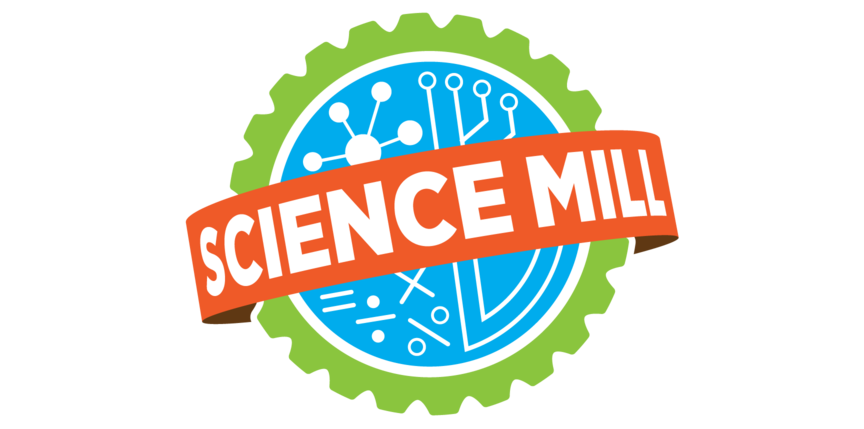From “space fossils” to foaming geysers, check out everything our young scholars discovered during the 2020-21 school year!
Our monthly Homeschool Days give students and their adults a chance to explore a STEM field in greater depth through activity stations, career presentations and age-based Learning Labs for grades K-12 led by Science Mill educators. (Plus, explore all the Mill’s STEM-focused exhibits, too!) All young scientists are welcome to join Homeschool Days, including homeschoolers, homeschooling groups, learning pods and students with asynchronous schedules.
Homeschool Days return in Fall 2021; join our email list to receive updates.
A proud microbiologist with her microorganism (K-2nd grade Learning Lab)
November: Careers in Biology
We explored the wonders of the living world with video presentations by zookeeper Lisa Keys and computational biologist Alyssa Cantu. Kids created monarch mobiles, used microscopes to reveal details hidden from the naked eye and learned bugs’ secret to walking on water.
DIY deep sea vents helped simulate the ocean floor (6th-12th grade Learning Lab)
December: Careers in Oceanography
We dove into December’s topic with curious questions about the ocean: Do sharks float? What happens when waves meet the shore? What does sunlight look like under thousands of feet of water? Students explored these questions and more at hands-on experiment stations and heard from marine biologist and commercial diver Samantha King.
Sharp observation skills helped chemists ID mystery reactions (3rd-5th grade Learning Lab)
January: Careers in Chemistry
We started 2021 with a fizz, foam, bubble! Kids solved chemistry riddles and uncovered the science behind chemical reactions that make foaming geysers and floating blobs. Chemistry professor Amanda Spiewak discussed unexpected chemistry careers and the future of the field.
Look out below! Engineers tested roller coaster designs (3rd-5th grade Learning Lab)
February: Careers in Engineering
We tinkered, tested and tackled new challenges! Kids constructed robotic hands with moving fingers, raced balloon-powered rockets and designed earthquake-proof towers that stood up to the shake test. Patrick Asiedu, Principal / CEO of Kings E360, explained why he’s always learning something new as a structural engineer.
DIY spectroscopes gave astrophysicists a new look at light (6th-12th grade Learning Lab)
March: Careers in Space Science
We turned the Science Mill into Mission Control in March, where kids could drive a Mars rover and design a launcher to carry cargo into space. Former NASA astronaut Col. Tom Henricks previewed the future of space exploration (including space vacations!) and astrophysicist Dr. Keith Hawkins shared how “space fossils” help us uncover the origins of our galaxy.
Model mountain ranges experienced wild weather (3rd-5th grade Learning Lab)
April: Careers in Earth Science
We fast-forwarded millions of years thanks to hands-on activities that showed how wind, water and other forces transform the Earth. Students traveled through the water cycle as a drop of rain and peeked into Earth’s core with augmented reality. Geologist and paleontologist Greg Wahlman explained how fossil detective work helps us better understand oil reservoirs around the world.
The right code guided Botley the Robot through the obstacle course (K-2nd grade Learning Lab)
May: Careers in Coding
We celebrated playful programming with Harry Potter-inspired coding games, mechanical computers (no electricity needed!) and bracelets designed with secret messages in binary code. Software engineer Chris Kam shared how coding with creativity took him from programming a digital Etch-a-Sketch to launching a software company.
MORE TO EXPLORE
Looking for more ways to explore science at home or expand your homeschool STEM curriculum? Check out the Explorer Zone, the Science Mill’s online learning hub, for DIY science activities and videos inspired by our exhibits. We also share STEM stories here on the Science Corner blog.
Looking for resources for a homeschool club or co-op? Plan a Group Visit to the Science Mill; we offer special discounts for groups of 15 or more. Or, check out Labs on the Go: each Lab pairs hands-on challenges with video “field trips” that show real-world science in action—all supplies are shipped directly to you!







